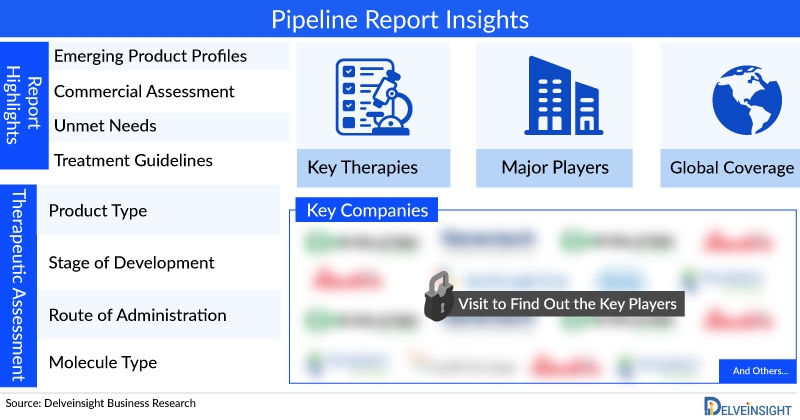DelveInsight’s “Erosive Esophagitis – Pipeline Insight, 2025” underscores the momentum in drug development targeting acid-independent pathways, mucosal defense enhancement, and esophageal barrier restoration. Novel potassium-competitive acid blockers (P-CABs) like vonoprazan are gaining traction with their rapid onset and sustained acid suppression, while therapies aimed at epithelial protection, such as alginate-based formulations and trefoil factor peptides, are advancing through clinical evaluation. Additionally, research into anti-inflammatory agents and cytokine modulators seeks to reduce chronic mucosal injury and prevent fibrosis.
Several late-stage candidates are exploring combination approaches, pairing potent acid suppression with mucosal healing agents to deliver superior outcomes over monotherapy. For instance, vonoprazan-based regimens have shown promising healing rates in refractory EE, while novel delivery systems are being designed to prolong mucosal contact time and optimize local therapeutic effects. Companies are also leveraging biomarkers of mucosal integrity and acid exposure to guide precision treatment strategies and monitor disease progression.
As 2025 approaches, the EE pipeline reflects a paradigm shift toward holistic management that goes beyond symptom control to achieve durable mucosal recovery and relapse prevention. With regulatory support for innovative acid suppression technologies and mucosal protectants, and growing clinical emphasis on quality of life and long-term outcomes, emerging therapies have the potential to redefine the standard of care for patients living with erosive esophagitis.
Interested in learning more about the current treatment landscape and the key drivers shaping the erosive esophagitis pipeline? Click here
Key Takeaways from the Erosive Esophagitis Pipeline Report
• DelveInsight’s erosive esophagitis pipeline analysis depicts a strong space with 3+ active players working to develop 3+ pipeline drugs for erosive esophagitis treatment.
• The leading erosive esophagitis companies include Eisai, Daewoong Pharmaceutical, YooYoung Pharmaceutical, and others are evaluating their lead assets to improve the erosive esophagitis treatment landscape.
• Key erosive esophagitis pipeline therapies in various stages of development include Azeloprazole, Fexuprazan, YYD601, and others.
• In August 2025, Sebela Pharmaceuticals announced topline results from the Phase III TRIUMpH program evaluating tegoprazan, a novel potassium-competitive acid blocker. In patients with EE, tegoprazan demonstrated statistically superior maintenance of healing over 24 weeks compared to lansoprazole, including in severe (LA Grades C/D) cases. The company plans to submit FDA applications for both EE and NERD indications in Q4 2025.
• In July 2024, The FDA expanded the approval of Voquezna to include treatment for non-erosive GERD (NERD), offering heartburn relief in patients without visible esophageal damage.
Erosive Esophagitis Overview
Erosive Esophagitis (EE) is a condition characterized by inflammation, irritation, or erosion of the lining of the esophagus, most commonly caused by the backflow of stomach acid into the esophagus—a condition known as gastroesophageal reflux disease (GERD). When this acid reflux becomes severe or chronic, it can damage the esophageal lining, leading to painful ulcers, difficulty swallowing, and chest discomfort. Common symptoms include heartburn, regurgitation, and sometimes bleeding or anemia if the erosion is significant. EE is typically diagnosed via endoscopy, where visible inflammation or ulceration of the esophageal lining can be observed.
Treatment for erosive esophagitis usually focuses on reducing acid production and healing the esophageal tissue. Proton pump inhibitors (PPIs) are the standard first-line therapy, as they effectively suppress stomach acid and promote mucosal healing. In recent years, newer drugs like potassium-competitive acid blockers (P-CABs), such as fexuprazan and azeloprazole, have emerged as alternatives, offering rapid and sustained acid suppression. Lifestyle changes—such as dietary modifications, weight loss, and elevating the head of the bed—can also help manage symptoms and prevent recurrence.
Find out more about erosive esophagitis medication at https://www.delveinsight.com/report-store/erosive-esophagitis-pipeline-insight
Erosive Esophagitis Treatment Analysis: Drug Profile
Fexuprazan: Neurogastrx
Fexuprazan is a next-generation potassium-competitive acid blocker (P-CAB) that works by reversibly inhibiting the proton pumps responsible for gastric acid secretion in the canalicular membrane. Unlike traditional PPIs, it offers more rapid and sustained acid suppression. Fexuprazan is currently in Phase III clinical trials for the treatment of Erosive Esophagitis.
YYD601: YooYoung Pharmaceutical
YYD601, also known as esomeprazole magnesium dehydrate, is a proton pump inhibitor (PPI) being developed by YooYoung Pharmaceutical. It is designed to treat conditions such as peptic ulcers and gastroesophageal reflux disease (GERD). YYD601 is currently undergoing Phase III clinical trials for the treatment of Erosive Esophagitis.
Learn more about the novel and emerging erosive esophagitis pipeline therapies.
Erosive Esophagitis Therapeutics Assessment
By Product Type
• Mono
• Combination
• Mono/Combination.
By Stage
• Late-stage products (Phase III)
• Mid-stage products (Phase II)
• Early-stage product (Phase I) along with the details of
• Pre-clinical and Discovery stage candidates
• Discontinued & Inactive candidates
By Route of Administration
• Oral
• Parenteral
• Intravitreal
• Subretinal
• Topical
By Molecule Type
• Monoclonal Antibody
• Peptides
• Polymer
• Small molecule
• Gene therapy
Scope of the Erosive Esophagitis Pipeline Report
• Coverage: Global
• Key Erosive Esophagitis Companies: Eisai, Daewoong Pharmaceutical, YooYoung Pharmaceutical, and others.
• Key Erosive Esophagitis Pipeline Therapies: Azeloprazole, Fexuprazan, YYD601, and others.
Explore detailed insights on drugs used in the treatment of erosive esophagitis here.
Table of Contents
1. Introduction
2. Executive Summary
3. Erosive Esophagitis Pipeline: Overview
4. Analytical Perspective In-depth Commercial Assessment
5. Erosive Esophagitis Pipeline Therapeutics
6. Erosive Esophagitis Pipeline: Late-Stage Products (Phase III)
7. Erosive Esophagitis Pipeline: Mid-Stage Products (Phase II)
8. Erosive Esophagitis Pipeline: Early Stage Products (Phase I)
9. Therapeutic Assessment
10. Inactive Products
11. Company-University Collaborations (Licensing/Partnering) Analysis
12. Key Companies
13. Key Products
14. Unmet Needs
15. Market Drivers and Barriers
16. Future Perspectives and Conclusion
17. Analyst Views
18. Appendix
About DelveInsight
DelveInsight is a leading Business Consultant and Market Research firm focused exclusively on life sciences. It supports Pharma companies by providing comprehensive end-to-end solutions to improve their performance. Get hassle-free access to all the healthcare and pharma market research reports through our subscription-based platform, PharmDelve.
Media Contact
Company Name: DelveInsight
Contact Person: Jatin Vimal
Email: Send Email
Phone: +14699457679
Address:304 S. Jones Blvd #2432
City: Las Vegas
State: Nevada
Country: United States
Website: https://www.delveinsight.com/

